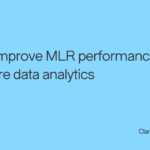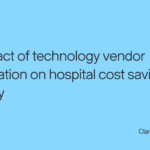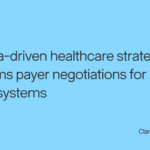The past few years have seen rapid acceleration and growth in the use of artificial intelligence (AI) in healthcare. From enhancing diagnostic accuracy, to leveraging predictive analytics and developing personalized care plans, to supporting decision making and enhancing patient engagement, the use of AI in healthcare has many promising applications. By harnessing these innovations, healthcare providers can optimize patient care management, leading to better health outcomes and operational efficiencies. This, in turn, strengthens market positioning, fosters patient trust, and helps to drive growth. Here are some ways AI is revolutionizing healthcare and setting the stage for a future where patient care is more precise, proactive, and personalized. One of the most promising ways AI can help providers with care management is by improving diagnostics. AI can help providers analyze medical images, pathology slides, and other diagnostics data more accurately and swiftly, which helps reduce diagnostic errors and improves patient outcomes. AI technologies alone won’t improve outcomes, but these tools can support providers in enhancing the accuracy and speed of diagnoses, saving both time and resources. Effectively trained deep learning algorithms can analyze complex medical imaging faster and often more accurately than the human eye, leading to earlier detection of conditions like cancer, heart disease, and neurological disorders. Providers leveraging AI in this way are better able to offer more reliable diagnoses, reducing the chances of misdiagnosis and the costs incurred from incorrect treatment administration. This increase in diagnostic accuracy not only boosts a provider’s reputation but it also significantly improve patient survival rates and quality of life. Providers are often sitting on large amounts of data that can help tell a more complete patient story. But unlocking that story can be challenging. By analyzing patterns in historical patient data, AI can predict patient deterioration, potential complications, or the likelihood of readmission. This enables proactive interventions, such as medication adjustments or additional treatments, which improve patient care and lower costs. Furthermore, when providers employ AI for predictive analytics, they can forecast acute events and worsening conditions before they become critical. Catching cases before they worsen allows for interventions that can prevent costly emergency room visits and extended hospital stays. Reducing the burden of unplanned care costs and optimizing the use of medical resources has both economic and operational advantages for providers. For patients, the timely care that results from effective use of predictive analytics can prevent complications and enhance overall outcomes, improving patient satisfaction and boosting patients’ trust in their provider and in the overall healthcare services they receive. Today more than ever, patients are seeking more individualized care from their providers. Developing ways to address the specific healthcare needs of a person is critical for health systems looking to attract and retain patients. Personalized medicine, powered by AI, can help to customize treatments to individual patient profiles, dramatically improving the efficacy of therapeutic interventions. For healthcare providers, this means differentiating their services by offering cutting-edge, highly effective treatments with fewer side effects. Delivering care that addresses a patient’s specific needs leads to fewer negative side effects, faster recovery times, and better patient outcomes, which in turn enhances patient satisfaction. Healthcare providers are often at the mercy of time. While the answers to their diagnostic questions are at their fingertips, digging through vast amounts of medical research requires more time and resources than most providers have. When used for clinical decision support, AI helps clinicians stay up to date on medical advancements without spending extensive time reviewing literature. Artificial Intelligence can integrate medical research and data to enhance decision-making and ensure evidence-based practices are followed. For healthcare organizations, this real-time clinical decision support enhances the quality of care, reduces variability in treatment approaches, and can lead to better clinical outcomes – all things that can boost an organization’s reputation as a leader in evidence-based practice. Patients want an experience that is easy to navigate and feels like personalized for them. Unfortunately, today’s healthcare systems often fail to deliver on this need. From scheduling appointments to securing referrals to billing, patients face many points of friction throughout their healthcare journey. But AI tools can help personalize patient interactions and improve communication between patients and providers, provide patient education, and encourage compliance with medication regimens and upcoming appointments. Patients who have a positive care experience tend to be more engaged patients, and engaged patients are more likely to adhere to treatment plans and lifestyle changes, directly driving improved health outcomes. Better patient engagement also results in reduced readmission rates, enhanced patient satisfaction scores, and ultimately, a stronger patient-provider relationship. Those more engaged patients are more likely to be repeat patients and share their positive experience, and those higher retention rates and positive patient reviews can help providers attract new patients. The integration of AI in healthcare is proving to be a game-changer in patient care management. From enhancing diagnostic accuracy and predictive analytics to personalizing medicine, supporting clinical decisions, and boosting patient engagement, AI offers a wide variety of benefits that can significantly improve patient outcomes and operational efficiencies. As AI technologies continue to evolve, their applications in healthcare will undoubtedly expand, offering even more innovative solutions to the challenges faced by providers and patients alike. Embracing AI in healthcare not only augments the capabilities of healthcare providers but also paves the way for a future where patient care is more precise, proactive, and personalized. By optimizing patient care management through AI, healthcare providers can ensure they remain at the forefront of medical innovation, ultimately leading to better health outcomes and enhanced patient satisfaction. The future of healthcare is here, and it is powered by AI.Using AI in healthcare for enhanced diagnostic accuracy
Unlocking the potential of predictive analytics with AI
AI and personalized medicine
Providing real-time clinical decision support through AI
How AI can power patient engagement
The future of AI in healthcare
- Author Details





